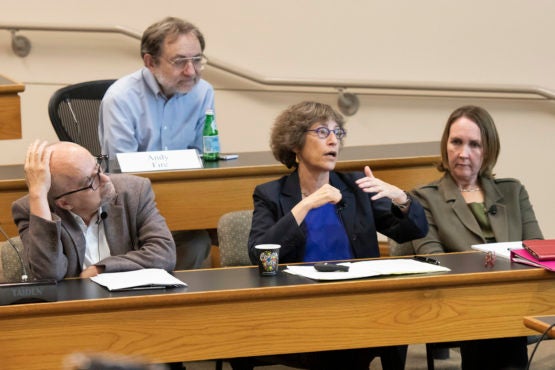Faculty Senate reflects on free speech and academic freedom
In the final senate meeting of the fall quarter, faculty members heard presentations on a variety of dimensions of free speech before adjourning to an executive session.
Thursday’s Faculty Senate meeting was devoted to issues of free speech, academic freedom and campus climate.
The meeting featured presentations by Debra Satz, the Vernon R. and Lysbeth Warren Anderson Dean of the School of Humanities and Sciences; Eamonn Callan, the Pigott Family Graduate School of Education Professor, Emeritus; and Jenny Martinez, the Warren Christopher Professor in the Practice of International Law and Diplomacy.
Martinez set the stage for the topic by presenting the legal context of free expression on campus, with particular regard to rights guaranteed by the First Amendment.

Debra Satz, center, was among those making presentations about free speech at the Faculty Senate meeting. (Image credit: L.A. Cicero)
She emphasized that free expression and inclusion need not be in opposition to one another; that it is valuable for the university to consider ways to model conversations on difficult topics; and that it is important to engage in “counter speech” to the most egregious speech.
There are several misconceptions about the First Amendment in relation to Stanford, including how the university can respond to speech on campus and the particular circumstances for free expression, Martinez said. For instance, a state law known as the Leonard Law restricts the ability of private universities in California to discipline students for speech that would be protected elsewhere.
Martinez also outlined a variety of other considerations that relate to constraints on free expression, including time, place and manner considerations and harassment and anti-discrimination laws.
In her remarks, Satz explored the values and principles governing freedom of expression on university campuses. Noting that people often conflate academic freedom and freedom of expression, she traced the background of academic freedom and how its concepts of freedom of thought, inquiry, discussion and teaching developed in the early 20th century.
She said that academic freedom should be considered a professional rather than an individual right, and that academics are responsible for setting and upholding the standards on speech, writing and expression through the engagement of peer review.
“The freedom that academics have in their research and teaching is guided by the pursuit of knowledge, free inquiry unconstrained by special interests,” she said.
She said that freedom of expression by individual students and faculty plays an important role in the classroom and in other settings on campus.
“Education requires confrontation with ideas that we don’t like,” Satz said. “Part of education is unsettling people’s considered opinions and getting them to think in new ways and learn from ideas that are outside their comfort zone.”
She concluded her remarks by suggesting what the university can do to support both free speech and academic freedom, including condemning hateful speech while explaining why we tolerate it, teaching students how to debate respectfully and modeling engagement with diverse points of view, such as using the Socratic method or playing devil’s advocate.
Callan’s remarks centered on civility, candor and open-mindedness in a university community.
Free speech can run counter to those virtues and impede the academic mission when it is interpreted as the right to speak in ways that are hateful or deceitful, he said. He added that it was the duty of the academic community to respond vigorously when speech “turns ugly,” noting how the aspirations articulated in Stanford’s Fundamental Standard provide an important tool for addressing this issue.
He also observed that sometimes the desire of students to avoid offending others can impede learning. Emphasizing the distinction between niceness and civility, he said that good teaching can and should address this issue by modeling civil dialogue among those with opposing views.
“In fact, I don’t believe we can contribute much to cultivating the cardinal intellectual virtue of open-mindedness unless we are forthright in bringing disciplinary as well as relevant political and moral controversies into our classrooms,” he said.
Following the presentations, Faculty Senate members adjourned to a private executive session to further discuss the issues.
The full minutes of the meeting will be available soon on the Faculty Senate website. The next senate meeting is scheduled for Jan. 24, 2019.
